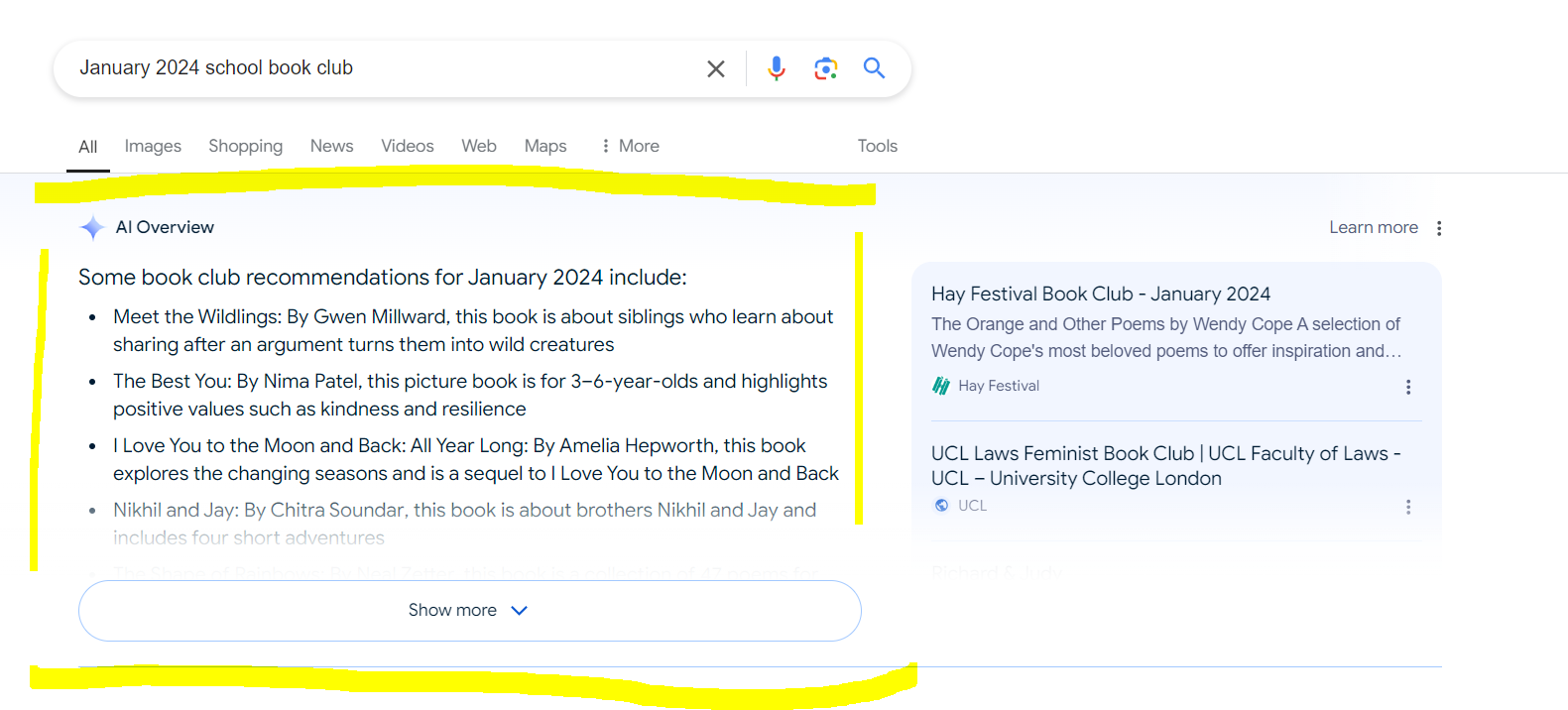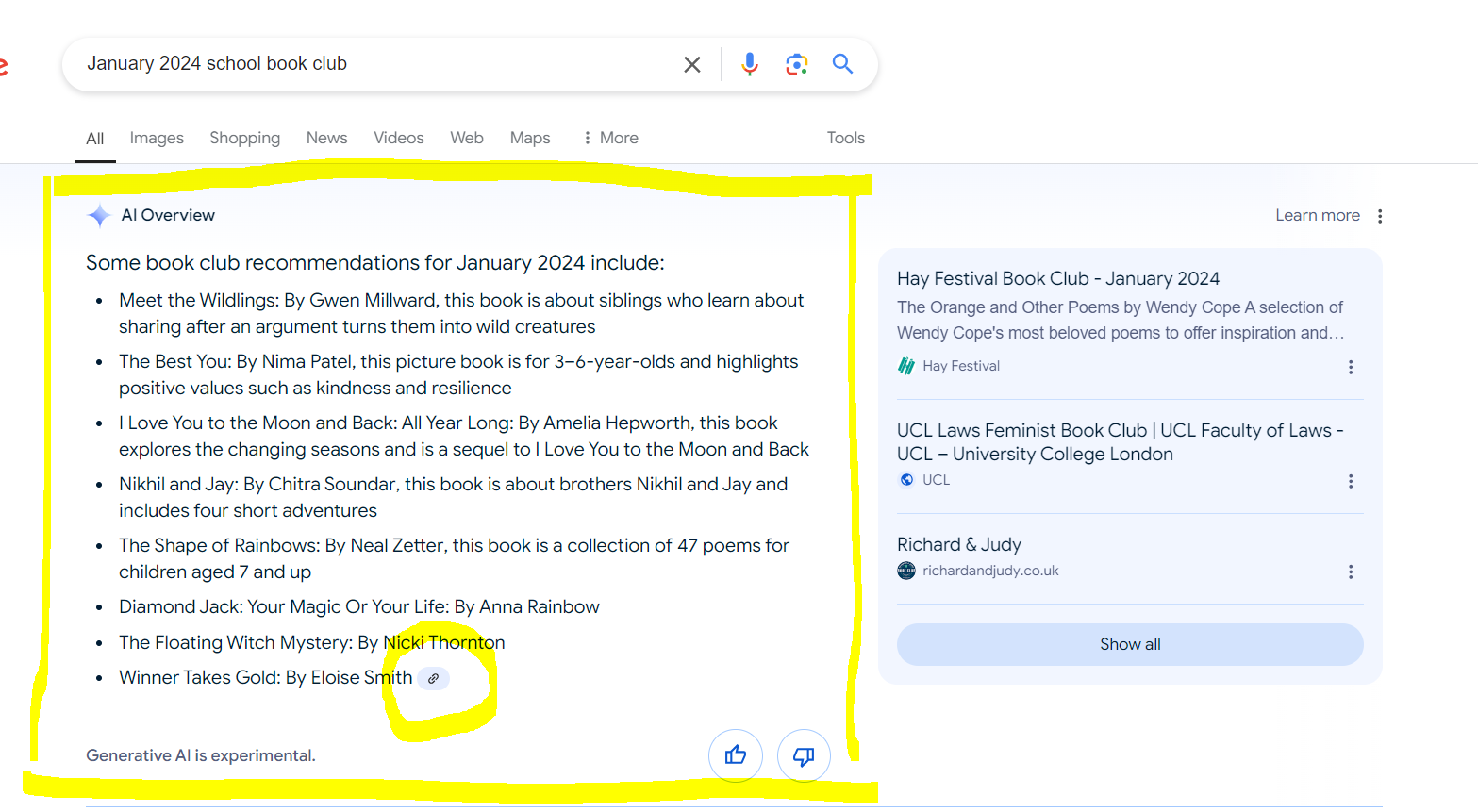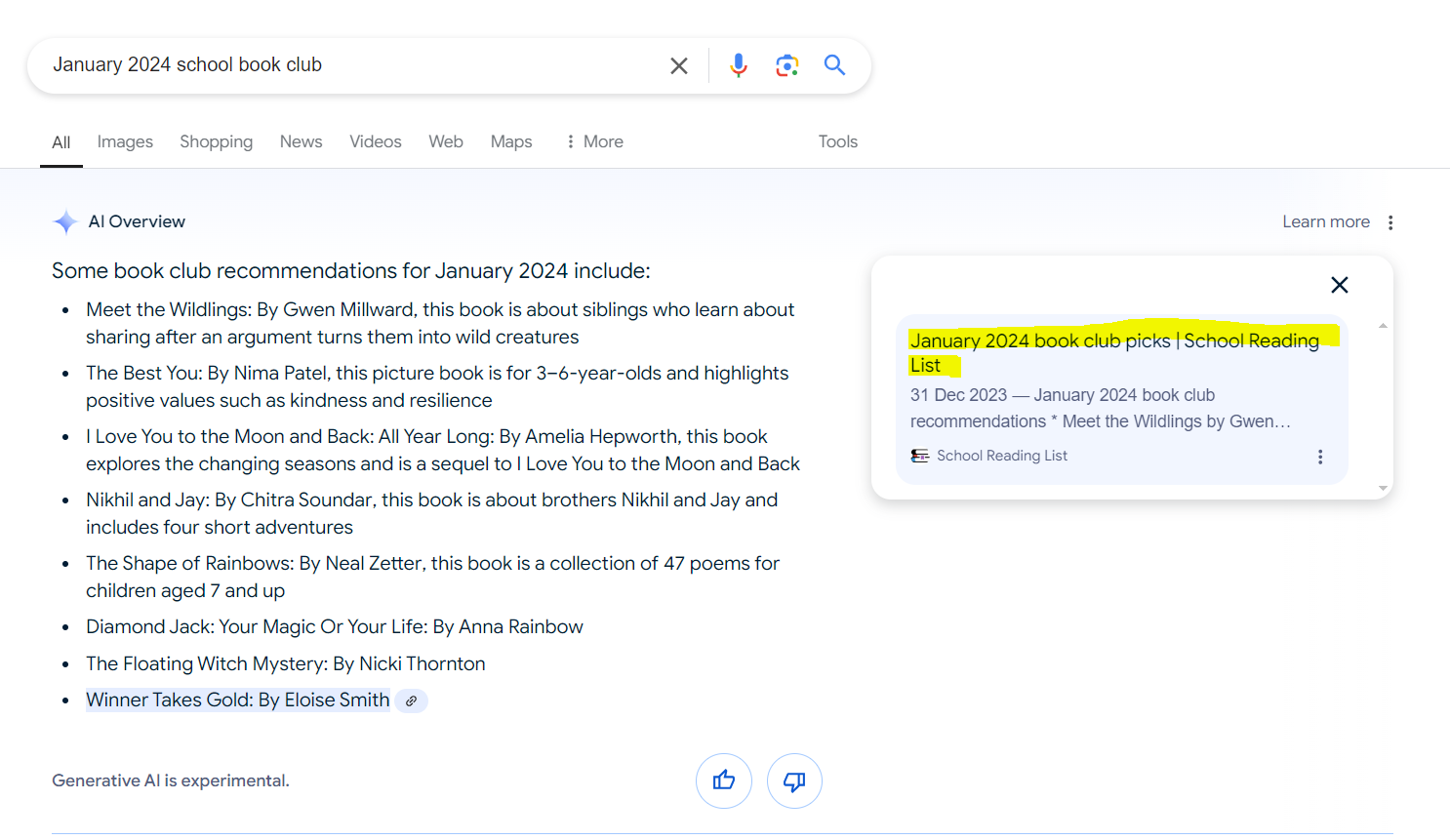
Episode 24
Episode 24 show notes
To view or buy the books featured in this episode, please see the links below.
- Recommended children’s and YA books released in October 2024 – buy from UK Bookshop Org.
- September 2024 school book club recommendations.
Affiliate Statement
As an Amazon Associate, the School Reading List earns from qualifying purchases. Disclosure: If you buy books linked to our site, we may earn a commission from uk.bookshop.org.
This podcast is supported by its listeners. If you choose to purchase something using links on our website or podcast notes we may earn a commission. No books were warped, dogeared, underlined with purple pen, eaten, cursed, cancelled, burned, or otherwise harmed in the making of this podcast.
Listen and subscribe
To listen to all the episodes in this podcast and to subscribe, see the School Reading List podcast page.
Episode 24 transcript
Why DuckDuckGo is better than Google for book searches
Teachers often rely on search engines to source materials, lesson plans, and reference resources. While Google remains the dominant search engine, its business model is increasingly questioned due to its extensive data collection and advertising practices. For teachers, privacy-conscious alternatives like DuckDuckGo offer distinct advantages, particularly when it comes to searching for English teaching materials and book-related resources.
Privacy Concerns: Google vs. DuckDuckGo
Google’s business model revolves around personalised advertising, made possible by tracking users’ search habits, browsing activity, and other personal data. While this model can result in more relevant advertising, it also raises privacy concerns. Google’s data collection practices extend across its ecosystem, including YouTube, Gmail, and Android devices, making it omnipresent in users’ digital lives. Despite the incognito mode, Google still collects certain types of data, and lawsuits have been filed in the United States challenging its data collection practices, even in private browsing sessions.
DuckDuckGo, by contrast, does not collect or store any personal information. Its business model revolves around non-targeted advertising, based purely on search terms rather than personal profiles. This privacy-first approach can be especially important for educators who wish to protect their own data as well as that of their students. DuckDuckGo’s transparency regarding its privacy practices is demonstrated through features like DuckDuckGo Privacy Essentials, a browser extension that blocks trackers and provides privacy ratings for websites.
Ethical considerations – plagiarism and IP theft
DuckDuckGo doesn’t collect or use your data, nor does it use generative AI.
Google’s generative AI search results, which appear at the top of the page, are not genuine search results. They are plagiarised and poorly paraphrased knock-offs of other people’s work, presented as original information from Google. These results do not credit the author or link back to the original source. Google doesn’t ask for permission; it simply steals. If this becomes the norm, creators will ultimately lose out and go out of business.
Take this example: each month, we publish a selection of new titles for school book clubs. Google often lists these in its search results. However, recently, when trying to find them via Google, our site no longer appears. If you search for “January 2024 School Book Club,” Google’s overview lists a series of books, all taken from our book club page.

Google has copied the text, paraphrased it poorly, and presented it without asking for permission or giving us any credit. There’s a ‘show more’ button which, when pressed, expands the text — still copied — and then includes a tiny link icon.

Pressing this does not take you to our website but opens a shaded box on the right-hand side listing “references.” We’re listed as a reference, but this is disingenuous since the sole source is our site.

If you click the shaded box, nothing happens. If you counterintuitively click the very first part of the text, it will take you to our site. It takes three unlikely actions for a user to arrive at our site. Clearly, Google doesn’t want you to leave its page, and to achieve this, it’s prepared to steal content and pass it off as its own. Do you think that’s ethical? Do you really want to use that kind of search engine in school?
Generative AI is like a parrot. It cannot create original content or suggest new ideas. If a parrot replaces thinking minds, and originality is replaced by regurgitation, new ideas will die, and innovation will be stifled. Would you rather ask a computerised parrot for information, or do you want to read the words of a living mind?
So, if you’re searching for books, resources, teaching materials, or anything else to encourage reading for pleasure, avoid search engines that use generative AI.
Filter Bubbles and Objective Search Results
One of the most significant criticisms of Google’s personalised search results is the creation of “filter bubbles.” Google’s algorithms tailor search results based on the user’s previous searches and online behaviour, which can reinforce pre-existing biases and limit exposure to diverse perspectives. This is particularly relevant when teaching English or other subjects that benefit from diverse viewpoints, such as literature, history, and social studies.
Google collects your data and uses it to create what it claims are personalised search results. But in reality, they are not. Google simply categorises you as being sufficiently like this person or that person, or this cohort of similar accounts, and decides that if they liked something, so will you. More often, it concludes that if they didn’t like something, neither will you, and excludes you from seeing information it doesn’t think you’ll read or click on, instead serving up content it bets you will engage with. That’s why Google’s search results are not diverse, they pander to majorities and marginalise minorities. Over the last 12 months, it has become more about algorithms and less and less about what you actually typed in and searched for. Google no longer aims to provide a direct answer to your query; it seeks to serve up information that keeps you on Google. Once you’ve clicked away, it aims to keep you using its browser. This is not the same as providing you with a good answer.
If you think about it, it’s not in Google’s interest to give you a quick, clear answer. Google makes money from serving ads on its search engine, and when you click through to a site, it profits from Google Ads on websites, driven by data from Google’s Chrome browser. So it’s hardly surprising that Google wants to keep you on its search engine for as long as possible, and if you do leave it, to keep you on its Chrome browser for as long as possible. When you consider this, providing you with a quick, clear, and useful answer to your search query isn’t really in Google’s interest.
Google stores and uses your data. It employs AI to give you search results it thinks you will like, based on what people it perceives as similar to you have clicked on. It creates an echo chamber where users never see anything new – just what’s trending within an AI-controlled clique. Increasingly, it’s impossible to find new, original, or different children’s and YA books using Google. It just gives you more of the same: more AI-generated responses and more adverts. If not already, but certainly in the future, Google will only suggest book sites that have shouted the loudest, spent the most money on advertising, or paid SEO experts to manipulate the search results. Google is squeezing the life out of independent publishers, bloggers, reviewers, and recommendation sites like the School Reading List.
DuckDuckGo, by not personalising search results, offers more objective and unbiased information. Teachers searching for resources on sensitive topics, such as political ideologies or social issues, may find that DuckDuckGo provides a broader range of perspectives. This is especially valuable in an educational setting, where it is important to present students with varied viewpoints rather than a narrow set of filtered results.
Simplified Search and Educational Engagement
For teachers and students alike, simplicity is often key. DuckDuckGo’s interface is streamlined and easy to navigate, with minimal distractions. The absence of personalised ads and the lack of data tracking make it an attractive tool for classroom use. When students use Google, their search history can shape future results, but with DuckDuckGo, every search starts fresh, making it ideal for projects and activities that require unbiased information.
DuckDuckGo’s simple interface also provides an opportunity to teach internet privacy. Students can learn about the importance of privacy in the digital age and how companies like Google track and monetise user data. Educators can use DuckDuckGo as a practical tool to introduce discussions about online safety, personal data, and the ethics of data collection. Such discussions can fit into social studies, digital literacy, or current affairs curricula, encouraging students to think critically about their online presence.
Searches for English Teaching and Book-Related Content
One of the key tasks for English teachers is sourcing reading materials, book recommendations, and related resources for their students. DuckDuckGo performs this task without the distraction of targeted advertising or personalised results, allowing teachers to focus purely on content. For example, when searching for English teaching guides or book reviews, teachers are less likely to encounter unrelated ads that might disrupt their search process.
Google’s search results, while comprehensive, can sometimes be influenced by commercial interests. High-ranking results are often driven by companies that pay for placement or have optimised their content for search algorithms. This can lead to a prioritisation of commercially-driven content, such as book sales websites, over more academic or pedagogical resources. DuckDuckGo’s search results are more likely to prioritise relevant, objective content based on the search query alone, making it a more reliable tool for educators looking for high-quality, non-commercial resources.
Challenges and Limitations
Despite its advantages, DuckDuckGo is not without its limitations. Google offers a range of advanced features that DuckDuckGo lacks, such as custom date ranges and reverse image search. These tools can be useful for teachers looking for time-specific resources or verifying the authenticity of online images. Additionally, Google’s extensive ecosystem, including Google Classroom, Google Drive, and other educational tools, makes it difficult for educators to completely avoid using Google services.
However, DuckDuckGo remains a viable alternative, especially when privacy is a top concern. For teachers seeking to protect student privacy or searching for unbiased content, DuckDuckGo’s simplicity and objectivity outweigh its limitations in certain contexts. Moreover, DuckDuckGo allows users to access other search engines through its “bangs” feature. This feature enables users to quickly reroute their search to Google, Amazon, Wikipedia, or other platforms by entering simple commands, adding an extra layer of flexibility.
Teaching Implications and Classroom Use
In the classroom, DuckDuckGo can be used not only as a search engine but also as a teaching tool. Teachers can introduce students to the concept of internet privacy and guide them through the practical implications of using different search engines. For example, educators can facilitate exercises in which students compare search results from DuckDuckGo and Google, discussing the differences in the types of content returned and the presence or absence of targeted ads.
By engaging with DuckDuckGo, students can learn about the broader implications of data collection and tracking. This can lead to discussions on issues such as online safety, digital footprints, and the role of government in monitoring internet activity. These conversations are increasingly important as students navigate a digital world where their personal information is constantly at risk.
For educators, DuckDuckGo offers a valuable alternative to Google, particularly when it comes to privacy and the objectivity of search results. Its lack of personalised advertising and search filters makes it an ideal tool for sourcing unbiased educational content, while its privacy-first approach aligns with growing concerns over data protection. While it may not replace Google entirely, DuckDuckGo provides a simpler, more transparent search experience that can benefit both teachers and students in various educational contexts.
By incorporating DuckDuckGo into the classroom, educators not only protect their privacy but also encourage students to think critically about their online behaviour and the importance of digital privacy. As concerns over data collection continue to rise, we think DuckDuckGo is an important alternative for those who value transparency and objectivity.
Some Final Thoughts:
- DuckDuckGo doesn’t save user data, so it couldn’t give you echo chamber responses even if it wanted to. It doesn’t provide AI-generated results, and there are fewer adverts.
- DuckDuckGo provides clear answers quickly.
- DuckDuckGo’s responses are more relevant, especially when searching for books and teaching resources.
- DuckDuckGo doesn’t personalise search results. The answers you get are the same as the answers for the next person. It doesn’t promote or exclude results based on your profile.
- DuckDuckGo uses quicker and simpler code, making it much less likely that search result pages or adverts will be blocked or throttled by your school’s security firewall.
- DuckDuckGo doesn’t use AI to steal content from books, reviewers and educational resource writers. DuckDuckGo links directly to the resources you want to use.
Episode 24 chapter markers
Part 1
- A rundown of recent book post.
- Top 30 recommended children’s and YA books coming out in October 2024.
Part 2
- Our rundown of great books for Year 5 children.
Part 3
Episode 24 credits
To see full details of licensing information, Creative Commons, GNU license credits and other attributions that apply to every episode of this podcast, see our School Reading List podcast credits information page.
Credits specific to this episode
- Kevin MacLeod – Bummin on Tremelo – (purchased lifetime extended license registered to Tom Tolkien license ID FML-170359-11969).
- Listener submitted monologues from debut and self-published authors. For more details, see the podcast episode’s details page.
Ask us a question | Leave us a voicemail shout-out
Click the button below to leave us a voicemail via SpeakPipe, if you would like to ask a question for one of our listener’s message slots, leave a shout-out or be featured in a future episode.
Buy me a coffee
If you found this free podcast useful and you would like to help – please consider a donation through the ‘Buy Me a Coffee’ service. Thanks.

